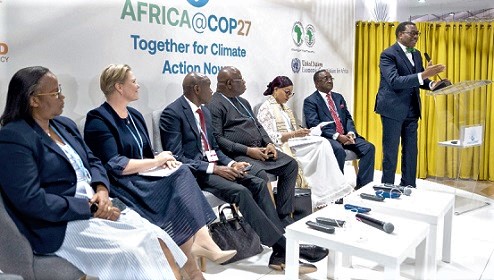
Sharing best practices at COP27: African countries seek to understudy Planting for Food and Jobs
The story of the agriculture flagship programme, Planting for Food and Jobs (PFJ), has triggered interest in some African countries seeking to understudy and learn best practices in replicating the policy in their respective countries.
At the African Development Bank high-level event on adaptation and agriculture at the just-ended COP27 at Sharm El-Sheikh in Egypt on the theme, “Mobilising innovative financing for building resilient and sustainable food systems on the African continent”, Ghana's model was acclaimed as one of the panaceas for food security in Africa.
Advertisement
The panel was made up of Ghana’s Minister of Food and Agriculture, Dr Owusu Afriyie Akoto, the Minister of Senegal, Ali Ngouille Ndiaye, the Agriculture Minister of Sierra Leone, Dr Abu Karim, and the Minister of International Development of Norway, Anne Beathe Tvinnereim.
It was attended by high-profile personnel and the donor community in the climate change advocacy space.
Interventions
Dr Akoto at the ministerial panel discussion took the panel members and the audience through the inception of the programme and the marked successes it had achieved so far in five years of its implementation.
He said the introduction of the programme led to the expansion and development of the local seed sector in the country.
“Research stepped up production of climate-resilient breeder and foundation seeds and similarly, private sector increased their production of certified seeds.
“A strong local seed sector now exists that continues to be strengthened with leadership from the private sector,” he told the audience.
Dr Akoto said the interventions contributed to the adoption of improved seeds and fertilisers with the seed use increasing from 11 per cent of farmers in 2016 to 53 per cent in 2021 and fertiliser application increased from eight kilogramme (kg) per hectare to 25 kg over the same period.
He told the audience that in the five years of implementation of the PFJ programme, quantity of fertilisers supplied to beneficiaries had increased from 121,000mt in 2017 to 239mt in 2021.
Since its implementation, Dr Akoto at various international platforms has marketed the programme to the international community, and it has been endorsed as an important step to food sufficiency and security.
Generating interest
Already, officials of some countries have visited Ghana to confer with the ministry on how to replicate the programme in their respective countries.
Neighbouring Burkina Faso, Togo, Malawi and Trinidad and Tobago are some of the countries that have sought assistance from Ghana at one time or the other for the replication of the programme.
The PFJ remains one of the trump cards of the government’s flagship programmes launched in 2017.
The programme, which hinges on smallholder farmers as the vehicle for its successful implementation, seeks to create food security and produce the raw materials to feed agro-processing industries, while creating jobs in the process.
Focus of PFJ
The PFJ initiative thrives on partnerships involving the government, the private sector and development institutions. Central to this equation are the smallholder farmers — themselves a component of the private sector as suppliers and customers within their value chain.
The PFJ focuses on delivering improved seeds, fertilisers and extension services to smallholder farmers across the country at a 50 per cent subsidy absorbed by the government.
International platform
The success of the programme has received recognition from international institutions as a panacea for food security.
Distinguished United Nations agencies, such as, the World Food Programme (WFP), the Food and Agriculture Organisation (FAO) and the International Fund for Agriculture Development (IFAD) as well as the Africa Union (AU) have, at separate events, held discussions with Dr Akoto on the flagship programme.
Trinidad and Tobago
Last year, the Special Advisor to the Prime Minister of Trinidad and Tobago, Dr John Alleyne, conferred with Dr Akoto to understand how the PFJ works and the possibility of their country adopting it for its benefit.
He explained that after the official visit to the country with his Prime Minister, Dr Keith Christopher Rowley, “I was asked to remain for an extra week in order to get more agricultural information and technology”.
Malawi
In July, 2019, a team of experts from the Ministry of Agriculture, Irrigation and Water Development of Malawi was in the country to understudy Ghana’s agricultural policies to replicate them in Malawi.
Their primary focus was the PFJ programme and how the MoFa had been able to involve the youth in agriculture, especially in the area of the greenhouse technology, where it had graduates at the centre.
The latest to express interest in understudying the PFJ programme for possible replication is the Minister of Agriculture of Sierra Leone, Dr Abu Karim.
Feeding Africa
In welcoming the agricultural ministers to the panel discussion, the President of the African Development Bank, Dr Akinwunmi A. Adesina, underscored the importance of food and pledged the bank’s commitment to support African farmers.
He said 65 per cent of the arable land in the world was in Africa, adding, “what Africa does with agriculture, will determine the future of food in the world”.
Dr Adesina insisted that Africa should be able to feed itself. “We cannot continue to go cap in hand begging for food.”
The event at the COP27 was a perfect ground for learning best practices of ensuring food sufficiency and security in Africa and the desire of Dr Karim to learn from Ghana is in the right direction.
Thankfully, Dr Akoto is always more than happy to share knowledge on PFJ with his colleagues at the least opportunity. After all, what good will it be if only Ghana is food sufficient and its neighbours are dying of hunger.?
E-mail: [email protected]




